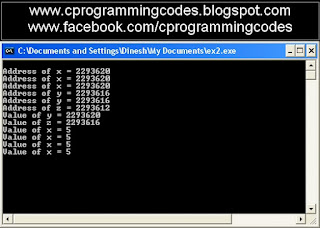Can a pointer variable, itself might be another pointer?
Yes, this pointer would be contains another pointer's address.
The following example/program should should make this point clear:
/*c program for pointer extend example*/
#include<stdio.h>
int main()
{
int x=5;
int *y, **z;
y = &x;
z = &y;
printf("\nAddress of x = %u", &x);
printf("\nAddress of x = %u", y);
printf("\nAddress of x = %u", *z);
printf("\nAddress of y = %u", &y);
printf("\nAddress of y = %u", z);
printf("\nAddress of z = %u", &z);
printf("\nValue of y = %u", y);
printf("\nValue of z = %u", z);
printf("\nValue of x = %u", x);
printf("\nValue of x = %u", *(&x));
printf("\nValue of x = %u", *y);
printf("\nValue of x = %u", **z);
getch();
return 0;
}
The output of the above program would be:
Read above program carefully, the addresses that get output might be something different.
The relationship between x, y and z can be easily summarized as:
Name ---------------- x y z
Value ------------------- 5 2293620 2293616
Address ---------------- 2293620 2293616 2293612
What is the meaning of int x, *y, **z;
Here, x is an ordinary int variable,
y is a pointer to an int i.e. integer pointer,
z is pointer to an integer pointer.
We can extend the above program still further by creating a pointer to a pointer to an integer pointer i.e. ***n
There is no limit on how far can we go on extending this definition. Possibly, till the point we can comprehend it. And that point of comprehension is usually a pointer to a pointer.
Related programs:
Yes, this pointer would be contains another pointer's address.
The following example/program should should make this point clear:
/*c program for pointer extend example*/
#include<stdio.h>
int main()
{
int x=5;
int *y, **z;
y = &x;
z = &y;
printf("\nAddress of x = %u", &x);
printf("\nAddress of x = %u", y);
printf("\nAddress of x = %u", *z);
printf("\nAddress of y = %u", &y);
printf("\nAddress of y = %u", z);
printf("\nAddress of z = %u", &z);
printf("\nValue of y = %u", y);
printf("\nValue of z = %u", z);
printf("\nValue of x = %u", x);
printf("\nValue of x = %u", *(&x));
printf("\nValue of x = %u", *y);
printf("\nValue of x = %u", **z);
getch();
return 0;
}
The output of the above program would be:
 |
| Screen shot for pointer extend example C program |
Read above program carefully, the addresses that get output might be something different.
The relationship between x, y and z can be easily summarized as:
Name ---------------- x y z
Value ------------------- 5 2293620 2293616
Address ---------------- 2293620 2293616 2293612
What is the meaning of int x, *y, **z;
Here, x is an ordinary int variable,
y is a pointer to an int i.e. integer pointer,
z is pointer to an integer pointer.
We can extend the above program still further by creating a pointer to a pointer to an integer pointer i.e. ***n
There is no limit on how far can we go on extending this definition. Possibly, till the point we can comprehend it. And that point of comprehension is usually a pointer to a pointer.
Related programs:
No comments:
Post a Comment